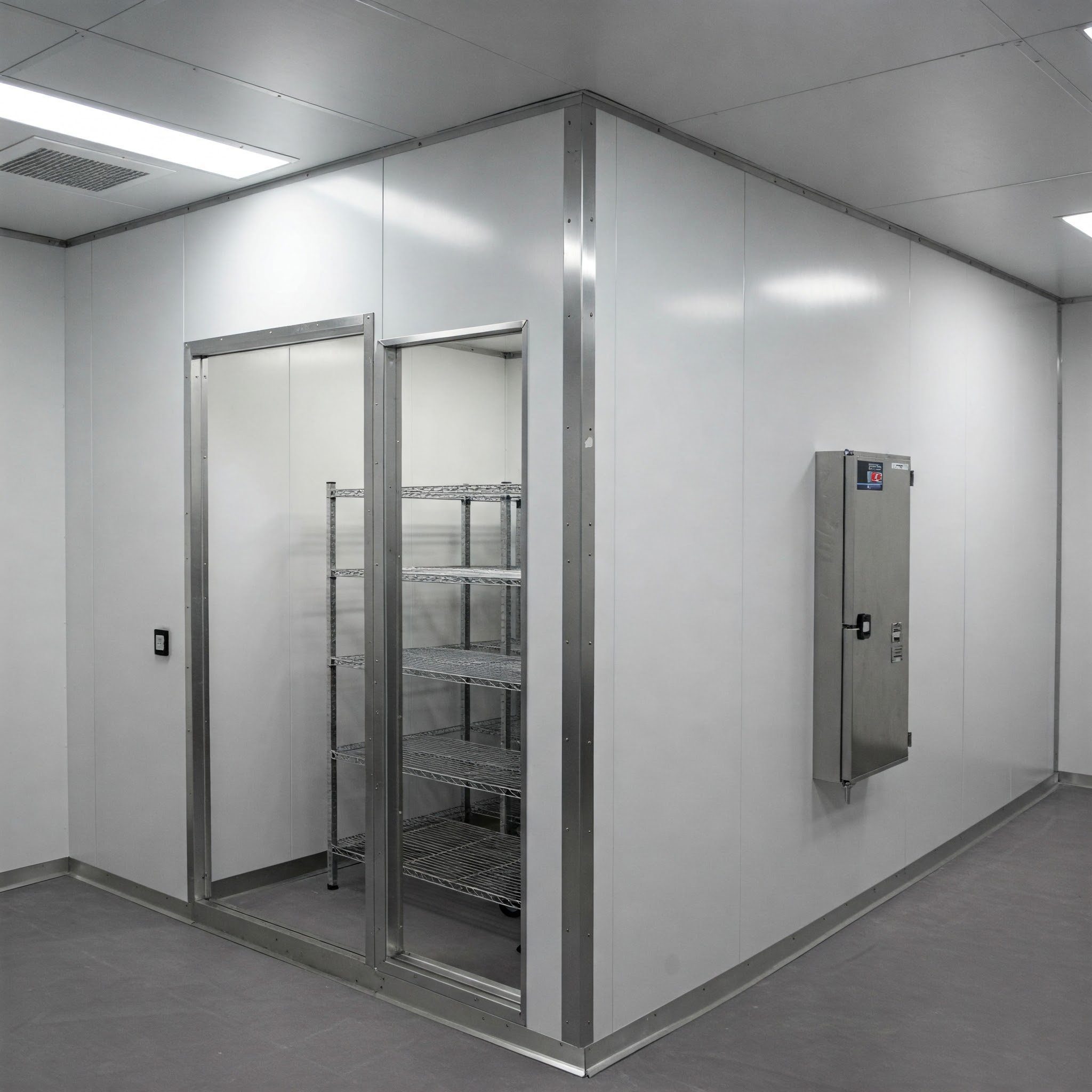Bespoke Cold Rooms: Custom Refrigeration Solutions for Commercial Storage
Bespoke cold rooms are custom-built refrigeration units designed to provide precise temperature control and maximum storage efficiency for businesses requiring large-scale cooling solutions. These rooms offer flexibility, scalability, and energy efficiency, making them ideal for restaurants, supermarkets, pharmaceutical industries, and food processing facilities.
Whether you need a walk-in freezer for bulk food storage or a temperature-controlled environment for sensitive products, choosing a bespoke cold room ensures optimal preservation and operational efficiency.
What Are Bespoke Cold Rooms?
Bespoke cold rooms are custom-designed refrigerated spaces built to fit specific business requirements. Unlike standard refrigeration units, these cold rooms can be tailored in size, temperature range, shelving configuration, and insulation thickness to ensure maximum efficiency.
They are commonly used in:
- Restaurants & catering businesses – For bulk food and ingredient storage.
- Supermarkets & grocery stores – To keep perishable goods fresh.
- Pharmaceutical & medical industries – For storing vaccines, medicines, and lab samples.
- Food manufacturing & processing – For maintaining cold supply chains.
- Hospitality & hotels – To store large quantities of perishable items efficiently.
Types of Bespoke Cold Rooms
1. Walk-In Chillers
- Description: Temperature-controlled rooms designed to store fresh produce, dairy, and beverages at chilled temperatures.
- Best For: Restaurants, supermarkets, and food distribution centers.
- Temperature Range: 0°C to 5°C (32°F to 41°F).
- Advantages:
- Maintains freshness and quality of perishable items.
- Customizable shelving and storage for easy organization.
- Energy-efficient cooling systems for low operational costs.
2. Walk-In Freezers
- Description: High-capacity freezing rooms for storing frozen foods and raw materials for extended periods.
- Best For: Food processing facilities, catering businesses, and large supermarkets.
- Temperature Range: -18°C to -25°C (0°F to -13°F).
- Advantages:
- Keeps products frozen at stable temperatures.
- Reduces spoilage and food waste.
- Can be designed with blast-freezing capabilities.
3. Modular Cold Rooms
- Description: Pre-fabricated, panel-based cold rooms that can be assembled and customized based on space requirements.
- Best For: Warehouses, hotels, and food distributors.
- Temperature Range: -25°C to +10°C (-13°F to 50°F).
- Advantages:
- Flexible installation with easy expansion options.
- Suitable for both chilled and frozen storage.
- Quick assembly for fast implementation.
4. Pharmaceutical & Medical Cold Rooms
- Description: Precision-controlled cold storage units designed for pharmaceutical products, vaccines, and biological samples.
- Best For: Hospitals, laboratories, and biotech companies.
- Temperature Range: 2°C to 8°C (35°F to 46°F) (for medicines) or -80°C (Ultra-Low Temperature) for vaccines.
- Advantages:
- Ensures strict temperature stability for sensitive products.
- Includes backup power and alarm systems for added security.
- Complies with health and safety regulations.
5. Blast Freezers & Rapid Cooling Cold Rooms
- Description: Special shock-freezing rooms that rapidly freeze food products to preserve freshness.
- Best For: Food processing industries, frozen meal producers, and seafood storage.
- Temperature Range: -30°C to -40°C (-22°F to -40°F).
- Advantages:
- Prevents ice crystal formation, maintaining food quality.
- Speeds up freezing time, ensuring better texture and flavor retention.
- Ideal for long-term frozen storage.
Key Features of Bespoke Cold Rooms
- Customizable Sizes – Tailored to fit small kitchens or large warehouses.
- Precise Temperature Control – Maintains consistent cooling or freezing levels.
- High-Quality Insulation – Ensures energy efficiency and minimal temperature fluctuations.
- Adjustable Shelving & Racking – Allows for organized storage of products.
- Advanced Refrigeration Systems – Includes energy-saving and eco-friendly options.
- Backup Power Systems – Ensures continuous operation during power outages.
- Hygienic & Easy-to-Clean Interiors – Reduces bacterial growth and contamination risks.
Applications of Bespoke Cold Rooms
- Food & Beverage Industry – Storing meat, seafood, dairy, and fresh produce.
- Retail & Supermarkets – Keeping perishable goods fresh for extended shelf life.
- Pharmaceutical & Medical Storage – Preserving vaccines, medicines, and blood samples.
- Hospitality & Catering – Managing bulk food supplies efficiently.
- Floral & Agricultural Storage – Keeping flowers and plants fresh before distribution.
Benefits of Bespoke Cold Rooms
- Custom-Built for Business Needs – Designed to fit specific space and temperature requirements.
- Enhanced Storage Efficiency – Maximizes usable space for organized stock management.
- Energy-Efficient Design – Uses advanced insulation and eco-friendly cooling systems.
- Improved Product Shelf Life – Maintains consistent cooling to reduce waste and spoilage.
- Scalable & Expandable – Modular options allow for future expansion as business grows.
- Compliance with Safety Standards – Meets food safety and pharmaceutical regulations.
Maintenance Tips for Bespoke Cold Rooms
Daily Maintenance
- Check and record temperature settings to ensure consistency.
- Keep doors closed when not in use to prevent temperature fluctuations.
- Inspect door seals and gaskets for proper sealing.
Weekly Maintenance
- Clean interior surfaces with food-safe disinfectants.
- Remove any expired or spoiled products.
- Inspect and test alarm and backup power systems.
Monthly Maintenance
- Check for ice buildup and defrost if necessary.
- Clean condenser coils to maintain efficient cooling performance.
- Inspect fans and ventilation to ensure proper airflow.
Troubleshooting Common Issues
1. Cold Room is Not Cooling Properly
- Cause: Dirty condenser coils, refrigerant leaks, or overloading.
- Solution: Clean the coils, check refrigerant levels, and reduce stock load.
2. Excessive Ice Buildup
- Cause: Faulty door seals or humidity inside the cold room.
- Solution: Replace damaged seals and ensure proper ventilation.
3. High Energy Consumption
- Cause: Poor insulation or inefficient cooling system.
- Solution: Upgrade insulation and service the refrigeration unit regularly.
4. Unusual Noises from the Cooling System
- Cause: Loose components or a failing compressor.
- Solution: Tighten fittings and seek professional servicing if needed.
Choosing the Right Bespoke Cold Room
Factors to Consider:
Budget & Installation Costs – Balance initial investment with long-term savings.
Size & Capacity – Determine storage needs based on business volume.
Temperature Range – Choose between chilled storage, deep freezing, or rapid cooling.
Energy Efficiency – Opt for insulated panels and eco-friendly refrigerants.
Shelving & Layout – Consider custom racks and organization solutions.
Backup Power & Safety Features – Ensure continuous operation and compliance with regulations.


